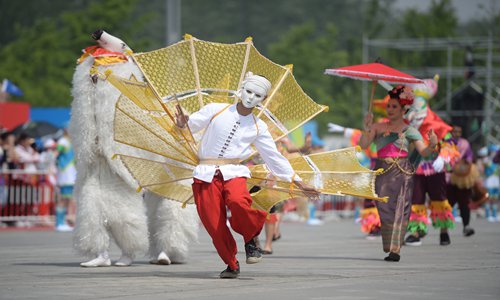
Performers dance and sing at the Asian Civilization Parade of the Conference on Dialogue of Asian Civilizations in Beijing on May 16, 2019. (Photo: IC)
Attendees from different countries to the Conference on Dialogue of Asian Civilizations (CDAC) shared China's idea for relations that support mutual learning and harmonious coexistence of different civilizations as opposed to a zero-sum clash.
China International Publishing Group's Institution of Contemporary China and World published a survey Thursday which showed that nearly 70 percent of respondents believe Asian countries should bond together to discuss and address regional issues.
The survey included 4,800 respondents from 12 countries, including China, Japan, India, Pakistan, Thailand and Saudi Arabia.
According to the survey, the spirit of the Silk Road was widely recognized. Some 78.4 percent trust the China-proposed Belt and Road Initiative will benefit their regions.
More than half of the interviewees agree that "the pursuit of better development" forms the primary commonality of Asian countries' dreams. Social stability and peace, along with more benefits for the people, came next, in terms of Asian people's dreams, the survey said, noting that Asian people prioritized their right to develop.
Zhang Weiwei, director of the China Institute at Fudan University in Shanghai, said that the philosophy of Chinese civilization could be shared by many other countries.
"Between different civilizations or social systems, there can be competition and also mutual learning," Zhang said.
With reform and opening-up in 1978, China opened itself to the world again, testing Chinese civilization on the international arena and the result proved that through mutual learning, its potential could be activated, and China's fast development also brought opportunities to the world, Zhang said.
This kind of mutual learning could help other different civilizations prosper and develop, Zhang noted. "It is unnecessary to have a clash of civilizations," he said.
Patrick Mendis, a former Rajawali senior fellow at Harvard University and a distinguished visiting professor of Sino-American relations at Peking University, believes that in some cases, the US could learn from China.
"Poverty alleviation is one of the things that the US should learn from China," Mendis said. "Reforestation to address climate change is what the world should learn from China."
China was also doing an excellent job at education, he said.
"These are the positive things China is demonstrating to the world and providing opportunities for mutual learning and better understanding between cultures, as I benefited from studying China and its still-striving civilization."
The so-called clash of civilizations was more likely to be born in the minds of unenlightened men than in the cultures themselves, Mendis said.
Concerns over US
Conference attendees also worried that a US zero-sum game mentality and "clash of civilizations" theory held by some US politicians might cause real tensions, even conflicts, among civilizations.
Laurence Brahm, founding director of the Himalayan Consensus Institute, said, "We are in a very complicated world where one country said we are first, and everyone else should come second, third and fourth. And China says 'a common shared destiny of mankind. We have to work together to address the common challenges, such as climate change.'"
Unlike the US, China won't tell others how to run their own governments, Brahm said.
China doesn't interfere with others' domestic affairs and just wants to do business and realize win-win cooperation, he said. "Now it expands to another level, which is cultural exchange."
"If you want to understand US politics, go to the football game," he said.
"People wear heavy armor. They bump into each other and there's always a winner, always a loser. In the end, there's mad silly entertainment that keeps everybody busy," he said. "But if you understand Chinese politics, you need to practice tai chi and if you want to understand Indian politics, you need to know yoga. And I don't think anyone in Washington, DC knows any of these."
The 20th century was the American century, Harvey Dzodin, a senior fellow at the Center for China and Globalization, told the Global Times.
"Now this is changing. It's China's turn, its Asia's turn," Dzodin said.


